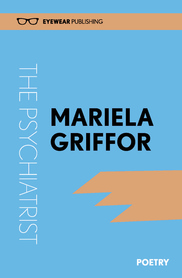 A REVIEW OF MARIELA GRIFFOR'S, THE PSYCHIATRIST (Eyewear Publishing, London, UK, 2013) by Carol Frost Near the end of Mariela Griffor’s powerful collection of poems, The Psychiatrist (Eyewear Publishing Ltd, 2013), readers learn of a woman’s promise from the narrator’s point of view to her lover to leave Chile “if we ever had/ a child, and if he was not there” (“Chiloe Island”). The personal promise explains a lot about the sense of heartbreak that lingers throughout the poems and about Griffor’s restraint in presenting a history of Pinochet tyranny. The relatively late revelation isn’t a ruse to keep readers in mystery but evidence of the author’s artistic decision to keep the difficult and complex events leading up to and after her exile just as they were. Lesser writers may have been unable to restrain themselves from giving readers a handle early—this is my story. I was victim, hero. The heartbreak in Griffor’s poetry is deeper than one person’s; she speaks for a country’s grief. It is only right that the reasons for her own grief are delayed. The style of the poems is the style of memory. Griffor’s stanzas and lines with their necessary abstractions, as in “My mind is futile” and “I learned/ their laughter before code names,” and intense sensory notation are not placed for rhetorical convenience but as they might occur while musing aloud. As Griffor invents the “new sounds, new men, new women” to tell the story of the war waged by Pinochet and his followers on Chile’s “own sons and daughters, her poems bend and extend to accommodate the different dimensions and perspectives of idealism, insurgency, betrayal, brutal policy, grief, and secrecy that the book explores. The poems present the coup and changing allegiances, the torturers—“Romero, Quezada, Coleman”—the “group” of leftists she was a part of, the codes and secrecy, and American complicity. There are poems, too, about family ties, of innocence and difficulty, of love in the time of strife, and death—by bullets and for one friend, Mauricio, by an addiction to Lucky Strikes, described in “Death in Argentina” as an irony. The topics are affecting in their own right, but Griffor’s strength is in the surprising intensity of her details. “Sometimes I drink water from the faucet,” she recalls telling Mauricio to temper the fantasy about her she knows he has developed. The detail and the motive for her telling him seem absolutely real, but there is something else about the line—the ungainliness and modest impropriety that we also recognize as real that intensifies the image. Another example of Griffor’s skill with detail comes at the end of “Exiles,” when speaking of having left Chile for Sweden, having left spring for winter, she tells that it was “the coldest winter in one hundred years/ with a mean temperature of -27.2 C in Vittangi.” The uncanny cold weather, we realize, gives us some sense of the physical coldness she must have endured in her first year of exile but also the coldness she needed in order to leave family, friends, her dead beloved, and her country. The Psychiatrist gives lessons about how to write political poetry. Individual lines in individual poems may seem a bit soft, lines like “Did their bodies and souls/ escape deterioration?” and “I don’t know with any certainty/ what to do next,” but overall the poems are challenging, substantive, and full of the art that is too often made subservient to craft. CAROL FROST's twelfth book of poems, Trilogy, is forthcoming in the fall (Tupelo Press, 2014). Others of her books include Pure, Love and Scorn, and Honeycomb. Four Pushcart Prize anthologies have reprinted her poems, and she has been the recipient of two NEA fellowships. She is the Theodore Bruce and Barbara Lawrence Alfond Professor of English at Rollins College, where she directs the yearly literary festival, Winter With the Writers. Comments are closed.
|
Name: Mariela Griffor Categories |

 RSS Feed
RSS Feed
